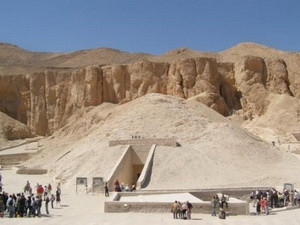Egypt reveals the mystery of the death of the last Pharaoh
A group of archaeologists and paleobotanists from Egypt, Italy and Germany on December 17 revealed the mystery of the cause of death of Egyptian Pharaoh Ramses III, after studying the 3,000-year-old mummy of this Egyptian king.
The results of the above research were recently published in the British Medical Journal.
Images recorded from the ancient mummy's CT scan showed that the corpse's larynx and aorta had been severed, causing a wound 70mm wide and almost reaching the spine. The sharp cut had severely damaged the soft tissue in the front of the neck.

Tomb of Ramses III. (Source: tripadvisor.com)
"There is no doubt that Ramses III died from the fatal cut mentioned above," said scientist Albert Zink of the EURAC Institute for Mummies and Icemen in Italy.
According to ancient documents, the two people most suspected of causing the death of King Ramses III were his cruel wife Tiy and his ambitious son, Prince Pentawere.
Researchers also mentioned the possibility that the king's killer could have been a henchman of the cruel queen Tiy herself.
After a year of careful study of the mummy, the team of scientists discovered that the wound on the king's neck was cleverly hidden by the cloth wrapped around the mummy. When examining the mummy, many people concluded that "there were no signs of injury or any wound on the body."
"We were extremely surprised to find things beyond imagination. A terrible truth happened to this Egyptian king," said scientist Zink.
The team has also hypothesized that the cut appeared after the emperor's death, as a step in the mummification process.
But this hypothesis was soon dismissed, because according to research, the mummification technique in ancient Egypt did not have the above procedure and preserving the intact corpse was very important to the ancient Egyptians, if anything it was just replacing body parts with other materials to prevent the mummy from rotting.
According to ancient documents, Egyptian Emperor Ramses III reigned from 1188 to 1155 BC and was considered a wise king and a talented military commander of Egypt./.
According to (TTXVN) - VT






